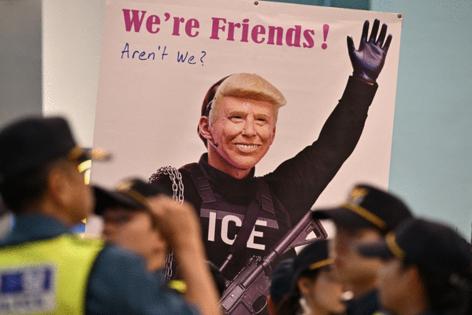Editorial: ICE raids will shackle US manufacturing ambitions
Published in Op Eds
The White House has brandished flamboyant, 12-figure investment pledges from foreign nations as proof its global tariff assault is producing rewards for Americans. Pressure alone, however, won’t transform those promises into factories on the ground.
A sweeping immigration raid on a Korean battery plant in Georgia on Sept. 4 underscores the challenge. Barely 10 days earlier, South Korean President Lee Jae Myung had flown to Washington to cement a trade truce, promising a $350 billion fund to help companies expand in the US, including in batteries, shipbuilding and autos; private Korean firms committed another $150 billion. Not surprisingly, images of hundreds of Korean employees then being shackled like criminals for suspected visa violations provoked a fierce backlash.
Ultimately, the workers were allowed to fly home without any charges being filed; the work at least some of them appear to have been doing — installing, calibrating and testing advanced equipment — is allowed on temporary visas under certain conditions. Regardless, construction has been delayed by several months. Visiting employees on several other South Korean projects across the US have been recalled or told not to leave their hotel rooms. At home, some are balking at new US assignments. Lee warned the raid “could have a significant impact” on future Korean investments.
It should be obvious why seemingly indiscriminate immigration raids — and, in particular, the manner in which detainees are regularly humiliated — might deter anyone from wanting to work or invest in the US. And that isn’t the only way the administration is undermining the goal of greater reshoring. The cancellation of clean-energy and electric-vehicle subsidies has led some companies to scrap planned projects. Most important, higher tariffs have raised the cost of key inputs — one reason manufacturing activity contracted in August for the sixth consecutive month.
Meanwhile, rapid policy swings are making it even harder than usual for companies to plan long-term investments. Tariffs that the White House declared under emergency powers may be struck down by the Supreme Court; it’s equally possible they might be replaced by something worse. In his State of the Union address, the president attacked Chips Act grants for semiconductor manufacturers despite widespread bipartisan support. Given other long-standing challenges, from the glacial pace of permitting to a lack of supplier ecosystems and skilled workers, creating additional obstacles is shortsighted at best.
The administration isn’t necessarily wrong to try to bring back advanced manufacturing to US shores, especially in key technologies such as semiconductors. Rebuilding the skilled workforce and manufacturing know-how those industries require could help mitigate supply-chain risks and threats to national security.
But if the White House is serious about setting up factories and not just winning flashy investment pledges, it ought to align its policies to that end. It should scale back tariffs and cease threats of more. It should redouble efforts to streamline permitting and invest in the hard, slow work of training workers to fill these jobs. Opening visa pathways so that foreign companies can more easily bring in experts to set up their factories and teach local workers how to run them would help.
More to the point, the White House should ponder where exactly those workers are going to come from if its needlessly heavy-handed deportation campaign continues. The National Association of Manufacturers predicts a shortage of nearly 2 million workers by 2033, in a sector that’s already heavily dependent on immigrants. Money isn’t the only thing a wiser administration ought to be welcoming from abroad.
____
The Editorial Board publishes the views of the editors across a range of national and global affairs.
©2025 Bloomberg L.P. Visit bloomberg.com/opinion. Distributed by Tribune Content Agency, LLC.
























































Comments